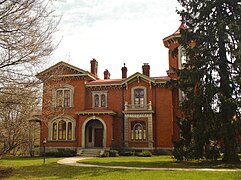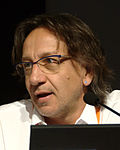University of Rochester
Topic: Organization
 From HandWiki - Reading time: 38 min
From HandWiki - Reading time: 38 min
 | |
| Latin: Universitas Rocestriensis | |
| Motto | Meliora (Latin) |
|---|---|
Motto in English | "Ever Better" (also, "Always Better") |
| Type | Private research university |
| Established | 1850 |
Academic affiliations |
|
| Endowment | $3.2 billion (2023)[2] |
| President | Sarah C. Mangelsdorf[3] |
| Provost | David Figlio |
Academic staff | ~1,000 faculty[4] |
| Students | 12,197 (Fall 2022)[5] |
| Undergraduates | 6,767 (Fall 2022)[5] |
| Postgraduates | 5,430 (Fall 2022)[5] |
Other students | 423 (Fall 2019)[5] |
| Location | Rochester , New York , United States |
| Campus | Midsize city[6] |
| Other campuses | |
| Newspaper | Campus Times |
| |u}}rs | Rochester Blue and Dandelion Yellow[7] Script error: No such module "College color". |
| Nickname | Yellowjackets |
Sporting affiliations | NCAA Division III –
|
| Mascot | Rocky the Yellowjacket |
| Website | www |
 | |
The University of Rochester is a private research university in Rochester, New York, United States.[8] It enrolls approximately 6,800 undergraduates and 5,000 graduate students. It was founded in 1850 and moved into its current campus, next to the Genesee River in 1955. With approximately 30,000 full-time employees, the university is the largest private employer in Upstate New York and the 7th largest in all of New York State.[9]
Rochester offers 160 undergraduate and 30 graduate programs across seven schools spread throughout five campuses.[10][11] The College of Arts, Sciences, and Engineering is the largest school,[12] which includes the Hajim School of Engineering and Applied Sciences, and houses some of the college's departments and divisions. The Institute of Optics was founded in 1929 and is regarded among the premier optics programs in the world.[13] The Departments of Political Science and Economics have influenced positivist social science since the 1960s.[14] The Rossell Hope Robbins Library serves as the university's resource for Old and Middle English texts and expertise.[15] The school is noted for its Rochester curriculum, which has only required one course and requires a breadth of study across fields.[16]
The university is also home to Rochester's Laboratory for Laser Energetics, a national laboratory supported by the US Department of Energy that is the largest university-based US Department of Energy program in the nation[17][18] The university is classified among "R1: Doctoral Universities – Very high research activity" and is a member of the Association of American Universities, which emphasizes academic research.[19][20]
Rochester alumni, faculty, and affiliates include recipients of 13 Nobel Prizes, 9 National Medals of Science, 13 Pulitzer Prizes, 45 Grammy Awards, and 20 Guggenheim Fellowships.[21]
History
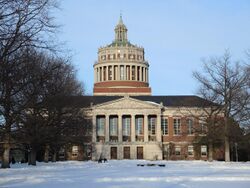
Early history
The University of Rochester traces its origins to The First Baptist Church of Hamilton (New York), which was founded in 1796. The church established the Baptist Education Society of the State of New York, later renamed the Hamilton Literary and Theological Institution, in 1817.[22] This institution gave birth to both Madison University and the University of Rochester. Its function was to train clergy in the Baptist tradition. When it aspired to grant higher degrees, it created a collegiate division separate from the theological division.[23][24]
The collegiate division was granted a charter by the State of New York in 1846, after which its name was changed to Madison University.[24] John Wilder and the Baptist Education Society urged that the new university be moved to Rochester, New York. However, legal action prevented the move. In response, dissenting faculty, students, and trustees defected and departed for Rochester, where they sought a new charter for a new university. Madison University was eventually renamed Colgate University.[24]
Founding
Asahel C. Kendrick, professor of Greek, was among the faculty that departed Madison University for Rochester. Kendrick served as acting president while a national search was conducted. He reprised this role until 1853, when Martin Brewer Anderson of the Newton Theological Seminary in Massachusetts was selected to fill the inaugural posting.[25]
The University of Rochester's new charter was awarded by the Regents of the State of New York on January 31, 1850. The charter stipulated that the university have $100,000 in endowment within five years, upon which the charter would be reaffirmed. An initial gift of $10,000 was pledged by John Wilder, which helped catalyze significant gifts from individuals and institutions.[25]
Classes began that November, with approximately 60 students enrolled, including 28 transfers from Madison.[25] From 1850 to 1862, the university was housed in the old United States Hotel in downtown Rochester on Buffalo Street near Elizabeth Street, today, West Main Street near the I-490 overpass.[26] On a February 1851 visit, Ralph Waldo Emerson said of the university:
'They had bought a hotel, once a railroad terminus depot, for $8,500, turned the dining room into a chapel by putting up a pulpit on one side, made the barroom into a Pythologian Society's Hall, & the chambers into Recitation rooms, Libraries, & professors' apartments, all for $700 a year. They had brought an omnibus load of professors down from Madison bag and baggage... called in a painter and sent him up the ladder to paint the title "University of Rochester" on the wall, and they had runners on the road to catch students. And they are confident of graduating a class of ten by the time green peas are ripe.''[27]
For the next 10 years, the college expanded its scope and secured its future through an expanding endowment, student body, and faculty. In parallel, a gift of 8 acres of farmland from local businessman and Congressman Azariah Boody secured the first campus of the university, upon which Anderson Hall was constructed and dedicated in 1862. Over the next sixty years, this Prince Street Campus grew by a further 17 acres and was developed to include fraternities houses, dormitories, and academic buildings including Anderson Hall, Sibley Library, Eastman and Carnegie Laboratories, the Memorial Art Gallery, and Cutler Union.[28]
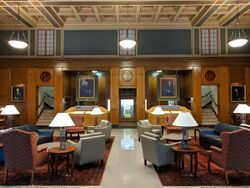
Twentieth century
The first female students were admitted in 1900, the result of an effort led by famous suffragist Susan B. Anthony and Helen Barrett Montgomery. During the 1890s, a number of women took classes and labs at the university as "visitors" but were not officially enrolled nor were their records included in the college register. President David Jayne Hill allowed the first woman, Helen E. Wilkinson, to enroll as a normal student, although she was not allowed to matriculate or pursue a degree. Thirty-three women enrolled among the first class in 1900, and Ella S. Wilcoxen was the first to receive a degree, in 1901.[29] The first female member of the faculty was Elizabeth Denio who retired as Professor Emeritus in 1917. Male students moved to River Campus upon its completion in 1930 while the female students remained on the Prince Street campus until 1955.
Anthony's work left a lasting impression on the university, with multiple awards, buildings and centers being named after her.[30][31]
Expansion
Major growth occurred under the leadership of Benjamin Rush Rhees over his 1900-1935 tenure. During this period, George Eastman became a major donor, giving more than $50 million to the university during his life.[32] Under the patronage of Eastman, the Eastman School of Music was created in 1921. In 1925, at the behest of the General Education Board and with significant support for John D. Rockefeller, George Eastman, and Henry A. Strong's family, medical and dental schools were created.[33][34] The university awarded its first PhD that same year.
During World War II, Rochester was one of 131 colleges and universities nationally that took part in the V-12 Navy College Training Program which offered students a path to a Navy commission.[35] In 1942, the university was invited to join the Association of American Universities as an affiliate member and it was made a full member by 1944.[36] Between 1946 and 1947, in infamous uranium experiments, researchers at the university injected uranium-234 and uranium-235 into six people to study how much uranium their kidneys could tolerate before becoming damaged.[37]
In 1955, the separate colleges for men and women were merged into the college on the River Campus. In 1958, three new schools were created in engineering, business administration, and education.[38] The Graduate School of Management was named after William E. Simon, former Secretary of the Treasury in 1986. He committed significant funds to the school because of his belief in the school's free market philosophy and grounding in economic analysis.[39]

Under the leadership of William Riker, the Department of Political Science at Rochester went from a six-person faculty with no graduate program to one of the most exciting political science departments in the United States. Riker established a new undergraduate program and trained an extraordinary number of graduate students. What emerged at Rochester, in the words of University of Georgia's Keith T. Poole and Princeton's Howard Rosenthal, was "the best doctoral program in political science in the world." According to Berkeley professors Nelson Polby and Eric Shickler, Rochester professor Richard Fenno "contributed more to the understanding of the U.S. Congress than any other scholar in the more than 200 years since the founding of the American nation".[40]
Financial decline and name change controversy
Following the princely gifts given throughout his life, George Eastman left the entirety of his estate to the university after his death by suicide.[41] The total of these gifts surpassed $100 million, before inflation, and, as such, Rochester enjoyed a privileged position amongst the most well-endowed universities. During the expansion years between 1936 and 1976,[42] the University of Rochester's financial position ranked third, near Harvard University's endowment and the University of Texas System's Permanent University Fund.[43] Due to financial mismanagement combined with a decline in the value of large investments and a lack of portfolio diversity, the university's place dropped to the top 25 by the end of the 1980s.[42] At the same time, the preeminence of the city of Rochester's major employers began to decline.
In response, the university commissioned a study to determine if the name of the institution should be changed to "Eastman University" or "Eastman Rochester University". The study concluded a name change could be beneficial because the use of a place name in the title led respondents to incorrectly believe it was a public university, and because the name "Rochester" connoted a "cold and distant outpost." Reports of the latter conclusion led to controversy and criticism in the Rochester community. Ultimately, the name "University of Rochester" was retained.[44][45][46][47]
In response, University President Thomas H. Jackson announced the launch of a "Renaissance Plan" for the college that reduced enrollment from 4,500 to 3,600, creating a more selective admissions process.[48] The plan also revised the undergraduate curriculum significantly, creating the current system with only one required course and only a few distribution requirements, known as clusters.[49] Part of this plan called for the end of graduate doctoral studies in chemical engineering, comparative literature, linguistics, and mathematics,[48] the last of which was met by national outcry.[50][51][52] The plan was largely scrapped and mathematics exists as a graduate course of study to this day.[53]
Twenty-first century
Shortly after taking office, university President Joel Seligman commenced the private phase of the Meliora Challenge, a $1.2 billion capital campaign, in 2005.[54] The campaign reached its goal in 2015, a year before the campaign was slated to conclude.[54] In 2016, the university announced the Meliora Challenge had exceeded its goal and surpassed $1.36 billion. These funds were allocated to support over 100 new endowed faculty positions and nearly 400 new scholarships.[55]
After and during the completion of the challenge, the university embarked on a new phase of construction, resulting in the addition of significant campus facilities. This expansion included the construction of two new student dormitories, O'Brien Hall (2013) and Genesee Hall (2017). Furthermore, other additions included Wegmans Hall (2016), a new building for the Computer and Data Science Departments, LeChase Hall (2013), designed to host the Warner School of Education, and Rettner Hall (2013).[56] The University also expanded the Medical Center, constructing a new Children's Hospital, cancer center, research building and tripled the size of the Strong Hospital emergency department.[57]
On September 1, 2017, a complaint was filed by eight current and former faculty members at the University of Rochester with the United States Equal Employment Opportunity Commission (EEOC). The complaint includes allegations of sexual misconduct/harassment by a tenure track faculty member, and condemnation of the response of the university administration.[58][59][60] The university's initial public response to the complaint was a claim that the allegations were thoroughly investigated and could not be substantiated.[61][62] A new, independent investigation found the individuals covered in the report had not violated policy; however, significant recommendations were made to push the university towards leadership in policy regarding relationships between faculty, staff, employees, and students.[63] On the same day as the release of the report, university President Joel Seligman publicly announced his previously tendered resignation.[64]
On December 17, 2018, the University of Rochester announced that Sarah C. Mangelsdorf would succeed Richard Feldman as president of the university. Her term started in July 2019, with a formal inauguration following in October during Meliora Weekend.[65] Mangelsdorf is the first woman to serve as president of the university,[65] and the first person with a degree in psychology to be appointed to Rochester's highest office.[66]
In 2021, the Sloan Performing Arts Center opened, providing space for theatrical programs, dance programs, concerts, and other activities and serves as a home for the Institute for the Performing Arts.[67] In 2023, the university completed the $51.5m purchase of College Town, a 312,000-square-foot, mixed-use complex near the Medical Center and began work on a $42m expansion of the Laboratory for Laser Energetics.[68]
Administration

The university is headed by a board of trustees, with Richard B. Handler as the chairman.[69] The board appoints the president of the university. As of 2018, ten people have held the role of regularly-appointed president, with the eleventh to be inaugurated in 2019.[70] On four occasions, the board of trustees has called upon members of the faculty to serve as president during periods of transition.
| Name | Tenure | Academic Field | Relationship to University |
|---|---|---|---|
| Martin Brewer Anderson | 1853–1888 | Theology | First President |
| David Jayne Hill | 1889–1896 | Diplomacy | Second President |
| Samuel Allan Lattimore | 1896–1898 | Chemistry | Professor of Chemistry |
| Henry Fairfield Burton | 1898–1900 | Latin | Professor of Latin |
| Benjamin Rush Rhees | 1900–1935 | Theology | Third President |
| Alan Valentine | 1935–1950 | English | Fourth President |
| Cornelis de Kiewiet | 1951–1961 | History | Fifth President |
| W. Allen Wallis | 1962–1975 | Economics | Sixth President |
| Robert Sproull | 1975–1984 | Physics | Seventh President |
| G. Dennis O'Brien | 1984–1994 | Philosophy | Eighth President |
| Thomas H. Jackson | 1994–2005 | Law | Ninth President |
| Joel Seligman | 2005–2018 | Law | Tenth President |
| Richard Feldman | 2018–2019 | Philosophy | Professor of Philosophy |
| Sarah C. Mangelsdorf | 2019– | Psychology | Eleventh President |
Campuses
River Campus
The River Campus is in a bend of the Genesee River about 2 miles (3 km) south of downtown Rochester and covers around 200 acres (81 ha). It is bounded by Bausch & Lomb Riverside Park, an 18-acre (7.3 ha) public park along the east bank of the Genesee River formerly known as the Olmstead River Walk, and Mount Hope Cemetery, where the grave sites of Susan B. Anthony and Frederick Douglass can be found. The River Campus was acquired in the late 1920s from the Oak Hill Country Club through a land swap deal orchestrated in part by Edwin Sage Hubbell and funded largely by George Eastman.

After a period of landscaping, grading, and construction, the original buildings of the campus were dedicated in 1930 when the first class of River Campus was welcomed to the Men's college. The main academic buildings are examples of the Greek Revival style in 20th-century collegiate architecture. The main buildings situated upon the Eastman Quadrangle are Rush Rhees Library at the head, flanked by the Morey Hall, Bausch & Lomb Hall, Lattimore Hall, and Dewey Hall. The Rush Rhees Library, the unofficial symbol of the university, is also home to the Hopeman Memorial Carillon, the largest carillon in New York State, featuring 50 bells that chime on the quarter-hour. During the summer, the carillon features a recital series in which various artists perform on the instrument.[72] Just off the quadrangle, in parallel, are Strong Auditorium and the Simon School of Business with the Interfaith Chapel opposite the Library. A Marc Mellon bronze of George Eastman was placed on the quadrangle in 2009.
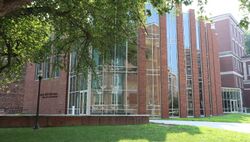
Over the last several decades, other academic buildings have been built south of the Eastman Quad, including Gavett Hall (dedicated to the Eastman Quad in 1930), Harkness Hall (1946), Hoyt Hall (1962), the Hopeman Engineering Building (1963), and Meliora Hall (1972). The southernmost part of the River Campus contains the new Science and Engineering Quadrangle: Wilmot Building (1961), Hylan Building (1971), Hutchison Hall (1972), the Computer Studies Building and Carlson Library (1987), the Robert B. Goergen Hall for Biomedical Engineering and Optics (2007), and Wegmans Hall for the Goergen Institute for Data Science (2017) and the department of Computer Science. LeChase Hall (2013) and the Ronald Rettner Hall for Media Arts and Innovation (2013) were added to the north of the Eastman Quad on the Wilson Quadrangle behind Lattimore Hall and Morey Hall, respectively.[73]
Todd Union, constructed in 1930, has been recommended by New York State's Board for Historic Preservation to be added to the State and National Registers of Historic Places as "a key site associated with Rochester's LGBTQ+ history". Todd Union has an early and significant association with the University of Rochester's Gay Liberation Front (UR GLF), an organization that worked to advance the gay liberation movement on campus and in the city of Rochester in the 1970s. Based out of an office in Todd Union, the UR GLF directly paved the way for numerous Rochester-based LGBTQ+ organizations.[74]
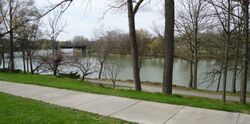
Students often congregate outdoors during the warmer months on the various quads. Other centers of student life include Todd Union, Frederick Douglass Dining Center, various locations inside Rush Rhees Library, and Wilson Commons, a student union designed by the architectural firm of I.M. Pei. Many academic buildings, including Rush Rhees Library, are connected by a series of tunnels,[75] which are used extensively, especially during unfavorable weather. All academic buildings and common areas, as well as residence halls, have authenticated Wi-Fi internet access.[76]
River Campus is home to a number of student exhibition spaces. The AsIs Gallery in the Sage Art Center showcases rotating exhibitions of student works from studio classes at U of R. As a work-in-progress critique space, this exhibition space provides students the opportunity to develop their work in a semi-professional space. The Gallery at the Art and Music Library features work from students and local artists in the highly trafficked Rush Rhees Art and Music Library. Hartnett Gallery, in Wilson Commons, is a student-supported gallery that showcases international and professional contemporary artists as well as an annual juried student exhibition. The pasSAGE is an annex of the Sage Art Center which features a long-term exhibition selected by a faculty committee. There is also a Senior Thesis Gallery in the Sage Arts Center that features senior undergraduate works.[77]

Medical Campus
The University of Rochester Medical Center (URMC) is the primary campus for the university's medical education and research as well as the main patient care facility. The Medical Center is next to the River Campus and is dominated by Strong Memorial Hospital, the School of Medicine and Dentistry building, and the Arthur Kornberg Medical Research Building. URMC also houses the School of Nursing and a variety of research centers, including the Wilmot Cancer Center, the Aab Institute of Biomedical Sciences, and the Clinical and Translational Sciences Institute.
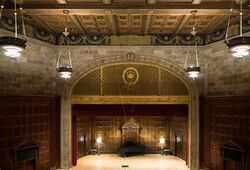
The Eastman School of Music
The Eastman School of Music is situated on its own campus in downtown Rochester, which includes a residence for students, classroom and performance facilities, and the Eastman Theatre, a 2,326-seat concert hall which also serves as the primary venue of the Rochester Philharmonic Orchestra. The campus also features the Sibley Music Library, which is the largest academic music library in North America, as well as the largest privately owned collection of sheet music. Students are housed at 100 Gibbs Street, a dormitory building constructed in 1991.
South Campus
The South Campus is in Brighton, immediately south of Rochester proper. The campus includes the Laboratory for Laser Energetics, a Department of Energy-funded national lab, the Center for Optics Manufacturing, the Center for Optoelectronics and Imaging, and the now-defunct Nuclear Structure Research Laboratory (NSRL). Graduate student housing is also provided at the Whipple Park complex. The South Campus also contains the Larry and Cindy Bloch Alumni and Advancement Center
Mount Hope Campus
The Mount Hope Campus consists of a number of old mansion homes including the Witmer Family House,[78] which serves as the official residence of the President of the university, and the Patrick Barry House,[79] which serves as the official residence of the provost of the university.
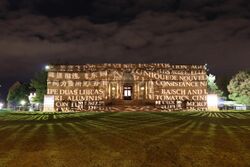
In between the two residences is the Ellwanger & Barry Nursery office, which is used as the office of the University of Rochester Press, which has been partnered with the British academic publisher Boydell & Brewer since 1989.
Memorial Art Gallery
The university's first permanent campus was at the former farm of Azariah Boody.[80] While a number of buildings still stand including Anderson Hall, the Eastman Laboratories, and a number of student dormitories, these buildings have been absorbed by private companies or the Rochester School of the Arts. The university retains control of a few acres of land including the land under the Sibley Library (razed), old campus gates, the Memorial Art Gallery's old and new wings, and the Cutler Union, a prime example of the Collegiate Gothic style of 20th-century architecture.
The Memorial Art Gallery was founded in 1913 as a part of the University of Rochester through a gift from Emily Sibley Watson as a memorial to her son, James George Averell.[81] It was designed by the prominent American architectural firm McKim, Mead, and White and occupies the southern half of the university's Prince Street campus.[82] It is the focal point of fine arts activity in the region and hosts the biennial Rochester-Finger Lakes Exhibition and the annual Clothesline Festival.
Gallery
-
River Campus at night
-
Memorial Art Gallery, Main Entrance
-
Gibbs Street, Downtown Rochester
-
College Town
-
Patrick Barry House
-
Kodak Hall
Academics

The University of Rochester's undergraduate enrollment includes approximately 6,400 full-time and about 330 part-time students from across the U.S. and over 115 countries.[83] Graduate enrollment includes approximately 3,750 full-time and about 1,600 part-time graduate students.[84] The university has more than 103,000 living alumni and employs nearly 2,300 tenure-track faculty, with more than 20,000 faculty and staff across the university and the Strong Health System.[85]
| Admissions statistics | |
|---|---|
2023 entering class[86] | |
| Admit rate | 38.9% |
| Yield rate | 21.0% |
| Test scores middle 50% | |
| SAT Total | 1410-1520 |
| ACT Composite | 31–34 |
The only required undergraduate course is the first-year writing seminar. In lieu of a core curriculum, undergraduates complete coursework in each of three disciplines: humanities, social sciences, and natural sciences. Students choose a major, consisting of more than ten courses, and a cluster, consisting of three related courses. The student must ensure at least a cluster is met in each discipline; however, second majors and minors are often used to fulfill these requirements. Students who pursue accredited engineering fields are exempt from this system and are required to have only one humanities or social science cluster.[87]
Rochester offers juniors and seniors the opportunity to apply for full funding for the fifth year of study. These programs include the Take Five Scholars program and the Kauffman Entrepreneurial Year (KEY) Scholarship. "Take-Five" and "Key", as they are colloquially known, allow for study in a field unrelated to an undergraduate major or the pursuit of an innovative entrepreneurial project with an impact on the local area, respectively.[88][89]
The university further offers a number of combined undergraduate - graduate tracks. These include Rochester Early Medical Scholars (REMS), Rochester Early Business Scholar (REBS), Graduate Engineering At Rochester (GEAR), and Guaranteed Rochester Accelerated Degree in Education (GRADE) programs. These programs are open to prospective students, who must apply for these prior to entering the university.[90]
Research
Rochester is a member of the Association of American Universities and is classified among "R1: Doctoral Universities – Very High Research Activity".[91][92] Rochester had a research expenditure of $450 million in 2022.[93] In 2008, Rochester ranked 44th nationally in research spending, but this ranking has declined gradually to 65 in 2022.[94] Some of the major research centers include the Laboratory for Laser Energetics, a laser-based nuclear fusion facility, and the extensive research facilities at the University of Rochester Medical Center. Recently, the university has also engaged in a series of new initiatives to expand its programs in biomedical engineering and optics, including the construction of the new $37 million Robert B. Goergen Hall for Biomedical Engineering and Optics on the River Campus.[95] Other new research initiatives include a cancer stem cell program and a Clinical and Translational Sciences Institute.[96][97] The university also has the ninth highest technology revenue among U.S. higher education institutions, with $46 million being paid for commercial rights to university technology and research in 2009.[98]
Notable patents include Zoloft and Gardasil. WeBWorK, a web-based system for checking homework and providing immediate feedback for students, was developed by University of Rochester professors Gage and Pizer. The system is now in use at over 800 universities and colleges, as well as several secondary and primary schools.[99] Rochester scientists work in diverse areas. For example, physicists developed a technique for etching metal surfaces, such as platinum, titanium, and brass, with powerful lasers, enabling self-cleaning surfaces that repel water droplets and will not rust if tilted at a 4-degree angle;[100] and medical researchers are exploring how brains rid themselves of toxic waste during sleep.[101]
Colleges of Arts, Sciences and Engineering
Arts, Sciences and Engineering (ASE) at the University of Rochester comprises the School of Arts and Sciences and the Hajim School of Engineering and Applied Sciences. Within ASE, the College is home for most undergraduates during their studies at the University of Rochester. The graduate training provided by the departments and programs ASE for over 60% of the PhD degrees awarded by the university. With 19 departments, more than a dozen programs, and numerous centers and institutes, Arts & Sciences is the largest school at the university. These include the Goergen Institute for Data Science, the Humanities Center, and the Institute for Performing Arts.
Established in 1958, the Hajim School comprises a variety of programs, departments, and institutes, including Audio and music engineering, Biomedical engineering, Chemical engineering, Computer science, Electrical and computer engineering, Institute of Optics and Mechanical engineering. The school has doubled the number of undergraduate students it encompasses since 2008.[102] The school was named after Edmund Hajim, a trustee of the university, in 2009 after a $30-million gift to the university.[103]
Eastman School of Music
The Eastman School of Music is a music conservatory offering both undergraduate and graduate education in a number of music fields, including composition, theory, and performance.
School of Medicine and Dentistry

The School of Medicine and Dentistry is a medical and dental school with both research and clinical programs.
Established in 1921, the School consists of approximately 1200 full-time faculty members and 650 voluntary clinical faculty members organized into 32 Departments and Centers. Nearly 500 graduate students and 200 postdoctoral appointees are in training.[104]
In 2022, the School received 5669 applications and accepted 70 students from AMCAS and 38 students from special matriculating programs, with an acceptance rate of 1.2%.[105] U.S. News ranks the school 32nd for research and 40th for primary care.[106]
The university is known for its competitive Rochester Early Medical Scholars (REMS) program, an eight-year BA/BS + MD program for outstanding undergraduate students.[107] Admission to the program is separate from admission to the College and requires additional application materials and interviews.[108]
The School of Dentistry is known as the Eastman Institute for Oral Health. Established in 1905 as Eastman Dental Center, it merged with the university in 1997.[109] As of 2020, it was the 7th top funded institution by the National Institute of Dental and Craniofacial Research (NIDCR), part of National Institutes of Health (NIH).[110]
School of Nursing

The School of Nursing is a nursing school on the campus of the University of Rochester Medical Center.
Warner School of Education
The Warner School of Education is the university's graduate school of education. It is located on the River Campus in LeChase Hall.
Simon Business School
Simon Business School is the graduate business school, based out of Schlegel and Gleason Halls on the River Campus.
U.S. News ranks the school 27th in the United States.[111]
| University rankings | |
|---|---|
| National | |
| Forbes[112] | 143 |
| THE/WSJ[113] | 52 |
| U.S. News & World Report[114] | 47 |
| Washington Monthly[115] | 83 |
| Global | |
| ARWU[116] | 151–200 |
| QS[117] | 224 |
| THE[118] | 133 |
| U.S. News & World Report[119] | 170 |
Rankings
The University of Rochester is accredited by the Middle States Commission on Higher Education.[120] In 2023, U.S. News ranked the school 30th in the "Best Value Schools Category".[121]
The University of Rochester was one of the 25 "New Ivies" in the 2007 Kaplan/Newsweek "How to Get into College Guide."[122] The list names institutions whose caliber of students is considered to rival traditional Ivy League schools.[122] The rankings are based on admissions statistics as well as interviews with administrators, students, faculty, and alumni.[122]
The Eastman School of Music ranks first among music schools in the U.S.[123]
|
USNWR graduate school rankings[124] | |
|---|---|
| Business | 27 |
| Engineering | 42 |
| Medicine: Primary Care | 40 |
| Medicine: Research | 32 |
| Nursing: Doctorate | 78 |
| Nursing: Master's | 22 |
| Biological Sciences | 80 |
| Chemistry | 58 |
| Clinical Psychology | 56 |
| Computer Science | 60 |
| Earth Sciences | 59 |
| Economics | 27 |
| English | 73 |
| History | 67 |
| Mathematics | 80 |
| Physics | 50 |
| Political Science | 19 |
| Psychology | 62 |
| Public Health | 67 |
| Statistics | 49 |
Student life
| Race and ethnicity[125] | Total | ||
|---|---|---|---|
| White | 42% | ||
| Foreign national | 27% | ||
| Asian | 12% | ||
| Hispanic | 8% | ||
| Other[lower-alpha 1] | 6% | ||
| Black | 5% | ||
| Economic diversity | |||
| Low-income[lower-alpha 2] | 19% | ||
| Affluent[lower-alpha 3] | 81% | ||
UR's official symbol is the seal of the university, which features a book, representing arts and sciences, a lyre symbolizing music, and a modified symbol of medicine.[126] The official flower of the university is the dandelion, purportedly prolific on the cow pasture that became the university's second campus.[126]
The official mascot of the university is a predatory wasp found throughout Rochester, the Yellowjacket. From 1983 to 2008, the yellowjacket mascot was named "URBee." However, when the university re-designed the mascot during the 2007–2008 academic year, a new name was chosen. As of February 1, 2008, the school's mascot is now known as "Rocky".[126][127]
The university uses Rochester Blue and Dandelion Yellow as its official colors, which are the prominent colors on the official regalia.[126] The motto of the university is "Meliora," which loosely translates to "better" with the connotation of "ever better," the meaning adopted by the university.[128]
The image of Rush Rhees Library's main dome serves as an additional icon for the University of Rochester. Rush Rhees Library at The University of Rochester was featured on the cover of the "Princeton Review 373 Best Colleges 2011 Edition".[129]
The song most often sung at college events, led often by the school's many a cappella groups, is The Genesee,[130] written by former Rochester student Thomas Thackeray Swinburne (Class of 1892).[131] Although less frequently used, the university also has an official Alma Mater, The Dandelion Yellow.[130]
Student organizations
The student body at the University of Rochester is both ethnically and socioeconomically diverse. There are over 200 active groups on campus, which range from cultural dance groups to the university's improvisational comedy troupe In Between the Lines.[132] Since 1873, the university has regularly printed its student newspaper, the Campus Times.[133] There is also the student-run, online-only publication, The Rival Rochester. This is a source of opinion, commentary, and satire. The university is well known for its a cappella groups, the YellowJackets and the Midnight Ramblers who have multiple local and national awards. The University of Rochester is also home to its own radio station, WRUR.
Activities and events
Wilson Commons Students Activities (WCSA) is a student-led group in charge of planning and organizing events for undergraduate students.[134] Annual events include the Celebrate Diversity concert and Yellowjacket Weekend during orientation week,[135][136] Winterfest Weekend in February, Spirit Week, Springfest Weekend and Senior Day.[137]
Meliora Weekend is the annual alumni reunion, usually held in October, bringing together thousands of alumni for a week of food, drink and dance.[138]
Students' Association
The Students' Association (SA) is the primary student governing body and includes most of the student groups at the university. It is governed by the SA Senate, President, and Vice President, all of whom are elected by the student body. The SA President may choose to appoint an advisory cabinet made up of a group of volunteer students. There is also a judicial branch, composed of the All Campus Judicial Council (ACJC), the members of whom are nominated by an interview committee and approved by the SA Senate. The SA Senate meets weekly and the longest meeting on record lasted longer than 8 hours. The offices of the SA are in the Wilson Commons student union.[139]
All student groups are required to have a constitution, elected officers, and approval from the senate in order to be recognized by the SA and have access to university funds. These funds are given yearly based on budgets submitted to the Students' Association Appropriation Committee (SAAC)[140] with supplemental funds available through special forms. All funds are derived from the mandatory Student Activities Fee.
Housing and Dining
The majority of undergraduate students at the university live and take classes on the River Campus. Students are required to live on campus for their Freshman and Sophomore years, and then have the option of remaining on campus or moving off campus. 7 out of 10 undergraduates choose to live on campus for all four years.[141]
Freshman live in one of two groupings of dorms - the First-Year Hill or the First-Year Quad. The First-Year Hill consists of Susan B Anthony Hall, the largest undergraduate dorm, and Genesee Hall, the newest undergraduate dorm. The First-Year Quad consists of Lovejoy, Tiernan, Gilbert and Hoeing Halls. Most freshman live in a double room, with a few in single or triples.[142][143] Upperclassman have multiple options to choose from, ranging from dorms in to slightly far away from river campus. These include a mixture of singles, doubles, apartments, suites. Suites are groupings of four to six rooms that share a common bathroom.[144]

There are seven fraternities with houses on campus, situated on the fraternity quadrangle near the First-Year Quad.[145] Smaller fraternities and all sororities occupies floors in residential buildings in Jackson Court and Hill Court.[146][147] There are a number of off-campus fraternities situated across the Genesee River on Plymouth Avenue and Genesee Street.
The university has two main dining halls, Danforth Dining (located in Susan B Anthony Hall) and Douglas Dining (located in Douglas Commons). Other options include Rocky's, a sandwich shop and lounge, the Pit (both located in Wilson Commons), and a variety of grab and go food options, coffee shops and cafes located across campus.[148]
Campus and area transportation
The university's campuses have their own university-sponsored system of buses, or shuttles, which provide free transportation from the River Campus to the Medical Center, South Campus, Eastman Campus, and Downtown Rochester. There are also lines that run between the River Campus and local shopping and entertainment destinations in Henrietta and Pittsford. On the weekends, a special shuttle loops to Rochester Public Market and Marketplace Mall. Most of the university-sponsored buses are named using a color system (e.g. Red Line) that indicates their respective route and allows for easy identification. Several bus lines of the Rochester-Genesee Regional Transportation Authority (RTS) made stops at the university until 2020.
The university participates in the Zipcar program, which allows students to rent cars on an hourly or daily basis.[149][150]
The Greater Rochester International Airport is a ten-minute drive to the west of the River Campus. In addition, Amtrak train and Greyhound bus have stations in downtown Rochester to the north of the campus. SA traditionally sponsors free student shuttles to the airport, train station, and bus station for Move-in, Move-out, Christmas, Thanksgiving and Spring Break.
Traditions
The university has a number of traditions and superstitions, both past and present.
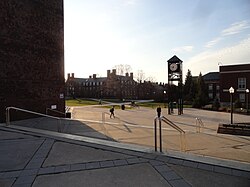
An old campus superstition states that walking through the Clock Tower in Dandelion Square will ensure a student never graduates or a prospective student is not admitted.[151]
Boar's Head Dinner
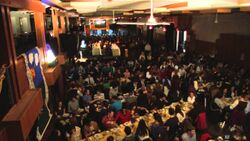
The Boar's Head Dinner is an annual medieval student feast that was first celebrated on December 17, 1934.[152] Students dress up in costumes, and the setting resembles a 16th Century English Court.[153] The first dinners were held in Todd Union and are currently held at the Feldman Ballroom in Douglas Commons. Among the evening's events is an annual 'Reading of the Boar', a retelling of the Boar's Head legend by a member of the faculty.[154]
Tunnel Painting
The university has an extensive tunnel system, originating from Rush Rhees Library. Painting the Eastman Quad tunnel started in the 1970s and is a way for student organizations to announce events and raise awareness. Freshman are now given a designated time during orientation week to paint the tunnels.
Wilson Day
Celebrated each fall during orientation week, first-year and incoming students get to work on community service projects. The events pay tribute to University benefactors and philanthropists Joseph C. Wilson, who founded Xerox.
Dandelion Day
Usually referred to as 'D-Day' or 'Drinking Day' by students, Dandelion Day is one of the university's longest standing traditions that celebrates the last full week of classes in the spring semester. Events usually include food trucks, a concert, and special parties held by fraternities and sororities. In 2008, Dandelion Day lost funding from the school administration but was eventually brought back due to student demand. Dandelion Day is usually held on the Friday of Springfest Weekend.[155]
Athletics
The University of Rochester's athletics teams are collectively known as the Yellowjackets. The university is a member of the Division III of the National Collegiate Athletic Association (NCAA), primarily competing in dual membership with the University Athletic Association (UAA) and the Liberty League. One exception to this is the men's squash team, which is consistently ranked top 5 in the NCAA Division I ranks.[156]
Rochester competes in 23 intercollegiate varsity sports: Men's sports include baseball[lower-alpha 4], basketball[lower-alpha 5], cross country[lower-alpha 5], football[lower-alpha 4], golf[lower-alpha 4], soccer[lower-alpha 5], squash[lower-alpha 4], swimming & diving[lower-alpha 5], tennis[lower-alpha 5] and track & field (indoor and outdoor)[lower-alpha 4]; while women's sports include basketball[lower-alpha 5], cross country[lower-alpha 5], field hockey[lower-alpha 4], lacrosse[lower-alpha 4], rowing[lower-alpha 4], soccer[lower-alpha 5], softball[lower-alpha 4], swimming & diving[lower-alpha 5], tennis[lower-alpha 5], track & field (indoor and outdoor)[lower-alpha 4] and volleyball[lower-alpha 5].
- Notes
- ↑ Other consists of Multiracial Americans & those who prefer to not say.
- ↑ The percentage of students who received an income-based federal Pell grant intended for low-income students.
- ↑ The percentage of students who are a part of the American middle class at the bare minimum.
- ↑ 4.00 4.01 4.02 4.03 4.04 4.05 4.06 4.07 4.08 4.09 Sport competes in the LL.
- ↑ 5.00 5.01 5.02 5.03 5.04 5.05 5.06 5.07 5.08 5.09 5.10 Sport competes in the UAA.
Accomplishments
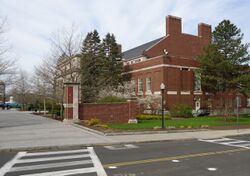
In 2009 women's soccer coach Terry Gurnett set records with over 400-lifetime wins.[157][158] In March 2010 the women's basketball team made it to the NCAA's Final Four. The men's soccer team made it to the NCAA Elite Eight in 2017 and the NCAA Final Four in 2018. In 2021, the softball team reached the Division III women's college world series.[159]
Club/intramural sports
There are also numerous clubs and intramural athletics groups. Popular club sports include hockey, ultimate frisbee, rugby, and soccer, which all have men's and women's teams. The men's rugby team has enjoyed recent success, with a New York State Conference Championship in 2011. The team was ranked 9th in the nation out of 151 Division III teams for the 2011–2012 season.[160]
Facilities
The main athletic facilities of the university are in Goergen Athletic Center and Prince Athletic Complex on the River Campus, with other facilities in the Spurrier building (River Campus) and the Medical Center.[161][162]
Prince Athletic Complex include Fauver Stadium, home of the track & field, football and soccer teams and Towers Field, the baseball stadium.[163]
Facilities in the Goorgen Athletic Center include the Speegle-Wilbraham Center, home of the Swimming and Diving program, Louis Alexander Palestra, Lyman Squash Center, an Indoor Recreation and Tennis Center, Bloch Fitness Center and the Hajim Gymnasium.[164]
The university's golf team enjoys a special arrangement with the Oak Hill Country Club, the former location of the River Campus, and regularly practices and competes there.[165]
Notable alumni and faculty
The University of Rochester has more than 120,000 alumni.[166] Individuals affiliated with the university have earned prestigious honors in multiple disciplines. Thirteen graduates or faculty members have earned a Nobel Prize, and 13 have earned a Pulitzer Prize,[167] while others have earned the highest honors awarded to Americans by the United States government. These include 9 recipients of the National Medal of Science (Arthur Kornberg, James V. Neel, Esther M. Conwell, Donald Henderson, John Prausnitz, Robert H. Dicke, John C. Slater, Victor Weisskopf, D. Allan Bromley),[168][169][170][171][172][173][174][175][176] 4 recipients of the National Medal of Technology and Innovation (Alejandro Zaffaroni, Rangaswamy Srinivasan, Dace Viceps Madore, Maya Koster),[177][178][179] 3 recipients of the National Medal of Arts (George Abbott, Anthony Hecht, Renée Fleming),[178][180][181] and 3 recipients of the National Humanities Medal (Elizabeth Fox-Genovese, Evelyn Brooks Higginbotham, David A. Berry).[182][183][184] Five members of the university community have been elected to the National Inventors Hall of Fame (Zaffaroni, Gary Starkweather, Lloyd Conover, Margaret Wu, Ching Wan Tang).[185][186][187][188][189] The university community continues to influence scientific progress; for example, nearly a quarter of the scientists on NASA's advisory board for the James Webb Space Telescope are alumni or faculty members.[190]
Rochester has had an impact on American higher education, counting among its alumni the former presidents of The University of Chicago, Massachusetts Institute of Technology, Tufts University, and the University of California, San Francisco, among others, and the deans of Harvard Medical School, Stanford University School of Medicine, UCSF School of Medicine, The University of Chicago Harris School of Public Policy Studies, and other graduate and professional schools. In total, the deans of four of the U.S. News & World Report top 10 medical schools were educated at Rochester.[191] Ten percent of the university's undergraduates later earn a PhD.[192]
Rochester graduates have been leaders in business. Notable alumni include Joseph C. Wilson,[193] founder and CEO of Xerox; Barry Meyer,[194] chairman and CEO of Warner Bros., and billionaires Paul Singer[195] and Alan Zekelman.[196]
In addition, Rochester alumni have served in the United States Congress or held other senior government positions. These include Congressmen Sereno E. Payne, Jacob Sloat Fassett, and Samuel S. Stratton, Ambassadors Kenneth Keating and George F. Ward, and senior government officials Steven Chu, Vittorio Grilli, Lawrence Kudlow, and Donald C. Winter.
-
George Abbott (BA 1911), writer and director, recipient of the National Medal of Arts
-
Kenneth Keating (BA 1919), United States Senator, Ambassador to India and Israel
-
Mary Calderone (MD 1939), medical director of Planned Parenthood and "mother of sex education"
-
Arthur Kornberg (MD 1941), recipient of the Nobel Prize in Physiology or Medicine
-
J.C.R. Licklider (PhD 1942), computer science pioneer
-
Herbert York (BS, MS 1943), 1st Chief Scientist of DARPA, founding chancellor of University of California, San Diego
-
Galway Kinnell (MA 1949), poet, recipient of the Pulitzer Prize and National Book Award
-
Donald Henderson (MD 1954), recipient of the National Medal of Science for eradicating smallpox and Presidential Medal of Freedom
-
Masatoshi Koshiba (PhD 1955), recipient of the Nobel Prize in Physics
-
Harvey J. Alter (BA 1956, MD 1960), recipient of the Nobel Prize in Physiology or Medicine for his work that led to the discovery of the hepatitis C virus
-
E. C. George Sudarshan (PhD 1958), theoretical physicist and a professor
-
Ron Carter (BA 1959), jazz musician, recipient of three Grammy Awards
-
Chuck Mangione (BM 1963), musician and actor, recipient of two Grammy Awards
-
Robert Forster (BA 1964), actor
-
Paul Singer (BS 1966), founder and CEO of Elliott Management Corporation
-
Larry Kudlow (BA 1969), broadcast news personality, columnist, and political commentator
-
Donald C. Winter (BS 1969), 74th United States Secretary of the Navy
-
Steven Chu (BA, BS 1970), recipient of the Nobel Prize in Physics and 12th United States Secretary of Energy
-
Richard Thaler (MA 1970, PhD 1976), former faculty at Simon Business School), recipient of the Nobel Memorial Prize in Economic Sciences
-
Susan Hockfield (BA 1973), neuroscientist, 16th President of MIT, former Provost of Yale University
-
Debra Jo Rupp (BA 1974), Kitty Forman on the sitcom That '70s Show
-
Renée Fleming (MM 1983), singer, recipient of the National Medal of Arts
-
Bruce Schneier (BS 1984), cryptographer, computer security professional, privacy specialist, and writer
-
Michele Boldrin (MS 1985, PhD 1987) economist, politician expert and Joseph Gibson Hoyt Distinguished Professor at Washington University in St. Louis
-
Allison Macfarlane (BS 1987), Chairman of the United States Nuclear Regulatory Commission (NRC) from July 9, 2012, to December 31, 2014.
-
Lance Reddick (BM), actor and musician
-
Donna Strickland (PhD 1989), optical physicist, recipient of the Nobel Prize in Physics
-
Josh Shapiro (BA 1995), Attorney General and Governor of Pennsylvania
-
Brian Daboll (BA 1997), American football coach and head coach for the New York Giants
See also
- George Eastman House
- University of Rochester Arboretum
References
- ↑ NAICU – Member Directory
- ↑ "ENDOWMENT BACKGROUND". University of Rochester. 2023. https://www.rochester.edu/endowment/overview/.
- ↑ "Wisconsin Provost Sarah Mangelsdorf named University of Rochester president". University of Rochester. 12 January 2018. https://www.rochester.edu/newscenter/wisconsin-provost-sarah-mangelsdorf-named-university-of-rochester-president-355342/.
- ↑ "Rochester at a glance". https://www.rochester.edu/about/.
- ↑ 5.0 5.1 5.2 5.3 "Quick Facts". https://www.rochester.edu/provost/university-data/about-institutional-research/university-of-rochester-fact-book/.
- ↑ "IPEDS-University of Rochester". https://nces.ed.gov/collegenavigator/?q=rochester&s=all&id=195030.
- ↑ University of Rochester Identity Guide. http://www.rochester.edu/creativeservices/identityguide_2017.pdf. Retrieved June 25, 2017.
- ↑ "About the University of Rochester". http://rochester.edu/aboutus/.
- ↑ Gardner, Kent (August 1, 2021). "University of Rochester & Affiliates - New York State Economic Impact 2019". https://reports.cgr.org/details/1976/.
- ↑ "Academic Programs at the University of Rochester" (in en). https://www.rochester.edu/academics/programs.html.
- ↑ "Academics at the University of Rochester" (in en). https://www.rochester.edu/academics/.
- ↑ "About Us" (in en-US). https://www.rochester.edu/college/aboutus/index.html.
- ↑ Kingslake, H. G.; Kingslake, R. (1970-04-01). "A History of The Institute of Optics" (in EN). Applied Optics 9 (4): 789–796. doi:10.1364/AO.9.000789. ISSN 2155-3165. PMID 20076282. Bibcode: 1970ApOpt...9..789K.
- ↑ "PhD Alumni: Department of Political Science: University of Rochester". http://www.sas.rochester.edu/psc/people/phd-alumni.php.
- ↑ "Rossell Hope Robbins Library: River Campus Libraries" (in en). https://www.library.rochester.edu/robbins/home.
- ↑ "The Rochester Curriculum" (in en). https://www.rochester.edu/about/curriculum.html.
- ↑ "World's Most Powerful Laser has the Energy of a Hydrogen Bomb". http://www.energytrendsinsider.com/2009/03/30/worlds-most-powerful-laser-has-the-energy-of-a-hydrogen-bomb/.
- ↑ "University of Rochester Points of Pride" (in en). https://www.rochester.edu/about/pride.html.
- ↑ "University of Rochester" (in en-US). https://carnegieclassifications.acenet.edu/institution/university-of-rochester/.
- ↑ "University of Rochester | Association of American Universities". https://www.aau.edu/who-we-are/our-members/university-rochester.
- ↑ "University of Rochester Points of Pride" (in en). https://www.rochester.edu/about/pride.html.
- ↑ "History" (in en). http://www.firstbaptistchurchhamilton.org/history.html.
- ↑ "University of Rochester History: Chapter 2, Hamilton vs. Rochester: RBSCP" (in en). http://rbscp.lib.rochester.edu/2308.
- ↑ 24.0 24.1 24.2 "Origins of Colgate University". Colgate University. http://www.colgate.edu/about/colgates-origins.
- ↑ 25.0 25.1 25.2 "University of Rochester History: Chapter 3, The Year of Decisions: 1850 RBSCP" (in en). http://rbscp.lib.rochester.edu/2309.
- ↑ "United States Hotel". https://www.facilities.rochester.edu/history/Hotel/index.htm.
- ↑ Gonnaud, Maurice (2014-07-14) (in en). An Uneasy Solitude: Individual and Society in the Work of Ralph Waldo Emerson. Princeton University Press. ISBN 978-1-4008-5890-3. https://books.google.com/books?id=W_r_AwAAQBAJ&q=ralph+waldo+emerson+journal+university+of+rochester+hotel+ladder&pg=PA422.
- ↑ "University of Rochester History: Chapter 6: A Critical Decade RBSCP" (in en). http://rbscp.lib.rochester.edu/2312.
- ↑ May, Arthur J. (1977) A History of the university of Rochester, Princeton: Princeton University
- ↑ "The Susan B. Anthony Center". https://www.rochester.edu/sba/.
- ↑ "First-Year Hill". https://www.rochester.edu/reslife/first-year/first-year-hill.html#sue-.
- ↑ "University of Rochester Library Bulletin: George Eastman and the University of Rochester, His Role, His Influence RBSCP" (in en). http://rbscp.lib.rochester.edu/3598.
- ↑ "History - School of Medicine and Dentistry - University of Rochester Medical Center - University of Rochester Medical Center" (in en). https://www.urmc.rochester.edu/smd/about/history.aspx.
- ↑ "History of Eastman Dental - Eastman Institute of Oral Health - University of Rochester Medical Center" (in en). https://www.urmc.rochester.edu/dentistry/about/history.aspx.
- ↑ "The News about the University of Rochester, 1944". GenWeb Monroe County. 2010. http://mcnygenealogy.com/book/news-uofr-4.htm.
- ↑ "University of Rochester History: Chapter 29, The Impact of Pearl Harbor RBSCP" (in en). http://rbscp.lib.rochester.edu/2335.
- ↑ Goliszek, 2003: pp. 136–137
- ↑ University of Rochester: History and Distinctions
- ↑ Schmitt, Eric (1986-10-29). "A School to Simon's Liking" (in en-US). The New York Times. ISSN 0362-4331. https://www.nytimes.com/1986/10/29/business/a-school-to-simon-s-liking.html.
- ↑ "About Us" (in en-US). https://www.sas.rochester.edu/psc/about/index.html.
- ↑ "Eastman dies by own hand". http://tech.mit.edu/V52/PDF/V52-N15.pdf.
- ↑ 42.0 42.1 Jarrell, Gregg; Dorkey, Frank C. (November 1993). "University of Rochester's Endowment Fund Review". https://urresearch.rochester.edu/fileDownloadForInstitutionalItem.action?itemId=4419&itemFileId=6639.
- ↑ Wang, Jialan; Schoar, Antoinette; Lerner, Josh (2008). "Secrets of the Academy: The Drivers of University Endowment Success". Journal of Economic Perspectives 22 (3): 207–222. doi:10.1257/jep.22.3.207. http://www.nber.org/papers/w14341.pdf. Retrieved December 2, 2019.
- ↑ [1] , University of Rochester Urged to Change Name
- ↑ [2] What's in a Name? Plenty, Argue University's Alumni
- ↑ [3] Our Towns--Change of Image in "Cold and Distant Outpost
- ↑ [4] Pieterse, "Our Work Is But Begun: A History of the University of Rochester 1850-2005" (Boydell & Brewer, 2014), pg. 165
- ↑ 48.0 48.1 "Appendix 2: Letter to Rochester Faculty from President Jackson, Provost Phelps, and Dean Aslin". https://www.jpbm.org/publicoutreach/roch-ap2.
- ↑ Rochester.edu , Press Release: Rochester Renaissance Plan for The College
- ↑ "Downsizing at Rochester: Mathematics Ph.D. Program Cut". https://www.ams.org/publications/journals/notices/199603/rochester.pdf.
- ↑ Arenson, Karen W. (1996-02-04). "Fears That Loss of a Math Ph.D. Program Figures in a Bigger Equation" (in en-US). The New York Times. ISSN 0362-4331. https://www.nytimes.com/1996/02/04/nyregion/fears-that-loss-of-a-math-phd-program-figures-in-a-bigger-equation.html.
- ↑ Arenson, Karen W. (1996-03-29). "Cut in Math Program Is Reversed At the University of Rochester" (in en-US). The New York Times. ISSN 0362-4331. https://www.nytimes.com/1996/03/29/nyregion/cut-in-math-program-is-reversed-at-the-university-of-rochester.html.
- ↑ Arenson, Karen W. (1996-02-04). "Fears That Loss of a Math Ph.D. Program Figures in a Bigger Equation" (in en-US). The New York Times. ISSN 0362-4331. https://www.nytimes.com/1996/02/04/nyregion/fears-that-loss-of-a-math-phd-program-figures-in-a-bigger-equation.html.
- ↑ 54.0 54.1 "UR's campaign reaches $1.2 billion goal" (in en). Rochester Democrat and Chronicle. https://www.democratandchronicle.com/story/news/2015/03/25/university-rochester-billion-fundraising-goal-reached/70465610/.
- ↑ "Meliora Challenge campaign exceeds expectations with historic $1.37 billion" (in en-US). NewsCenter. 2016-07-07. http://www.rochester.edu/newscenter/meliora-challenge-campaign-exceeds-expectations-historic-1-37-billion/.
- ↑ "River Campus of the University of Rochester". https://www.facilities.rochester.edu/history/RC/.
- ↑ "Medical Center of the University of Rochester". https://www.facilities.rochester.edu/history/MC.
- ↑ "UR sexual harassment case: What you need to know" (in en). Rochester Democrat and Chronicle. https://www.democratandchronicle.com/story/news/2017/09/14/florian-jaeger-university-rochester-sexual-harassment-controversy-celeste-kidd/665410001/.
- ↑ "Florian Jaeger: UR motion to dismiss lawsuit alleging cover-up denied" (in en). Rochester Democrat and Chronicle. https://www.democratandchronicle.com/story/news/education/2019/08/29/florian-jaeger-university-rochester-lawsuit-motion-dismiss-denied-cantlon-kidd-time-person-of-year/2149837001/.
- ↑ "UR EEOC Full Text" (in en-US). https://www.scribd.com/document/358503878/University-of-Rochester-Eeoc-3.
- ↑ "University of Rochester responds to sexual harassment complaint against professor" (in en). Rochester Democrat and Chronicle. http://www.democratandchronicle.com/story/news/2017/09/10/university-rochester-mother-jones-eeoc-professor-sexual-harassment-seligman/652080001/.
- ↑ "UR complainants vs. Seligman: War of words heats up over prof accused of sexual harassment" (in en). Rochester Democrat and Chronicle. http://www.democratandchronicle.com/story/news/2017/09/12/ur-professor-florian-jaeger-complaint-heats-up-seligman/656628001/.
- ↑ Wang, Vivian (2018). "Exonerated, University of Rochester President Steps Down" (in en-US). The New York Times. ISSN 0362-4331. https://www.nytimes.com/2018/01/11/nyregion/exonerated-university-president-resigns.html.
- ↑ "Office of the President:: University of Rochester". January 11, 2018. https://www.rochester.edu/president/memos/2018/resignation.html.
- ↑ 65.0 65.1 "University of Rochester names first woman president, Sarah Mangelsdorf" (in en). https://www.democratandchronicle.com/story/news/2018/12/17/university-rochester-new-president/2334516002/.
- ↑ "Meet Provost Mangelsdorf" (in en-US). https://provost.wisc.edu/meet-the-provost/.
- ↑ "Sloan Performing Arts Center". https://www.facilities.rochester.edu/history/RC/Sloan.htm.
- ↑ "University of Rochester buys College Town for $51.5M, eyes better connections with campus" (in en). 2023-07-28. https://www.wxxinews.org/local-news/2023-07-28/college-town-university-rochester-purchase.
- ↑ "Richard Handler '83 elected University Board chair at October meeting" (in en-US). 2018-10-05. http://www.rochester.edu/newscenter/richard-handler-elected-university-board-chair-at-october-meeting-341432/.
- ↑ "University of Rochester Welcomes Next President" (in en-US). http://www.rochester.edu/presidential-search/.
- ↑ University of Rochester: Presidents of the university
- ↑ "FAQ : Hopeman Memorial Carillon: University of Rochester". http://www.sas.rochester.edu/mur/carillon/faq.html.
- ↑ Interactive Map of the River Campus
- ↑ Miller, Sara (2023-03-20). "Todd Union earns historic designation" (in en-US). https://www.rochester.edu/newscenter/todd-union-state-national-registers-historic-places-553862/.
- ↑ Rochester.edu , tunnels
- ↑ UR Wireless Coverage
- ↑ Campus Galleries : Art & Art History : University of Rochester . Rochester.edu (2012-01-12). Retrieved on 2014-03-25.
- ↑ "Rochester Review • University of Rochester" (in en). https://www.rochester.edu/pr/Review/V68N4/inrev04.html.
- ↑ "Patrick Barry House" (in en). http://www.rochester.edu/currents/V36/V36N11/barry_house/.
- ↑ "Rochester Review :: University of Rochester". http://www.rochester.edu/pr/Review/V71N6/feature1.html.
- ↑ Elizabeth., Brayer (1988). Magnum opus: the story of the Memorial Art Gallery, 1913-1988 (1st ed.). Rochester, N.Y.: The Gallery. ISBN 978-0-918098-02-3. OCLC 18496839. https://archive.org/details/magnumopusstoryo00bray.
- ↑ Klauder, Charles Zeller; Wise, Herbert Clifton (1929). College architecture in America and its part in the development of the campus. New York : London: C. Scribner's Sons. http://catalog.hathitrust.org/Record/000606566. Retrieved March 1, 2018.
- ↑ Admissions, Undergraduate. "University Facts" (in en-US). https://admissions.rochester.edu/campus-life/university-facts/.
- ↑ Admissions, Undergraduate. "University Facts" (in en-US). https://admissions.rochester.edu/campus-life/university-facts/.
- ↑ "About Us". University of Rochester. University of Rochester. http://www.rochester.edu/aboutus/.
- ↑ "Class of 2020 Profile". University of Rochester. https://admissions.rochester.edu/campus-life/university-facts/.
- ↑ "Clusters" (in en-US). https://www.rochester.edu/college/ccas/undergraduate/curriculum/clusters.html.
- ↑ "Take Five Scholars Program". http://www.rochester.edu/college/CCAS/TakeFive/.
- ↑ "e5 Program : College Center for Advising Services: University of Rochester". http://www.rochester.edu/college/ccas/handbook/e5.html.
- ↑ Combined Admissions Programs
- ↑ "University of Rochester". Association of American Universities (AAU). https://www.aau.edu/who-we-are/our-members/university-rochester.
- ↑ "Carnegie Classifications Institution Lookup". Center for Postsecondary Education. https://carnegieclassifications.iu.edu/lookup/view_institution.php?unit_id=195030.
- ↑ "Higher Education Research and Development (HERD) Survey2022". National Science Foundation. https://ncsesdata.nsf.gov/profiles/site?method=rankingBySource&ds=herd.
- ↑ "Higher Education Research and Development (HERD) Survey2022". NSF. https://ncses.nsf.gov/surveys/higher-education-research-development/2022.
- ↑ "Senator Robach Awards $3 Million for Biomedical Optics Research". http://www.rochester.edu/news/show.php?id=2659.
- ↑ URMC Press Release: Wilmot Launches Cancer Stem Cell Research Program
- ↑ URMC: The New Clinical and Translational Sciences Institute
- ↑ "Technology Commercialization Annual Report Fiscal Year 2009". http://www.rochester.edu/ventures/wp-content/uploads/2013/11/Annual_Report_FY2009.pdf.
- ↑ "WeBWorK Sites - WeBWorK". http://webwork.maa.org/wiki/WeBWorK_Sites.
- ↑ 21 January 2015, BBC News, Laser-etched metal 'bounces' water , Retrieved January 21, 2015a, "...the technique could help produce hygienic, easily-maintained devices - from solar panels to toilets - that do no rust or ice up.... The team, from the University of Rochester..."
- ↑ Meeri Kim, October 19, 2013, Washington Post, Brains flush toxic waste in sleep, including Alzheimer's-linked protein, study of mice finds , Retrieved January 22, 2015, "...study author and University of Rochester neurosurgeon Maiken Nedergaard...."
- ↑ "About the Hajim School" (in en-US). https://www.hajim.rochester.edu/about/index.html.
- ↑ "Rochester's Engineering School Named for Edmund A. Hajim". http://www.hajim.rochester.edu/bme/news-events/news/archives/2009/2009-05-15_hajim-school.html.
- ↑ "About the School - School of Medicine and Dentistry - University of Rochester Medical Center - University of Rochester Medical Center". https://www.urmc.rochester.edu/smd/about.aspx.
- ↑ "2026 Class Profile". https://www.urmc.rochester.edu/MediaLibraries/URMCMedia/2026-Class-Profile.pdf.
- ↑ "University of Rochester - Best Graduate Schools". https://www.usnews.com/best-graduate-schools/top-medical-schools/university-of-rochester-04078.
- ↑ "Rochester Early Medical Scholars (REMS)". https://www.rochester.edu/bulletin/policies/admissions/rems/.
- ↑ Admissions, Undergraduate. "Rochester Early Medical Scholars (REMS)" (in en-US). https://admissions.rochester.edu/academics/rems/.
- ↑ "History of Eastman Dental - Eastman Institute of Oral Health - University of Rochester Medical Center". https://www.urmc.rochester.edu/dentistry/about/history.aspx.
- ↑ "UR/Eastman Institute for Oral Health Ranks 7th in NIH Funding" (in en-us). https://www.urmc.rochester.edu/news/story/ur-eioh-ranks-7th-in-nih-funding.
- ↑ "Simon Business School - US News Graduate Rankings". https://www.usnews.com/best-graduate-schools/top-business-schools/university-of-rochester-01159.
- ↑ "America's Top Colleges 2019". Forbes. https://www.forbes.com/top-colleges/list/.
- ↑ "U.S. College Rankings 2020". Wall Street Journal/Times Higher Education. https://www.timeshighereducation.com/rankings/united-states/2020#!/page/0/length/25/sort_by/rank/sort_order/asc/cols/stats.
- ↑ "2021 Best National University Rankings". U.S. News & World Report. https://www.usnews.com/best-colleges/rankings/national-universities.
- ↑ "2020 National University Rankings". Washington Monthly. https://washingtonmonthly.com/2020college-guide/national.
- ↑ "Academic Ranking of World Universities 2020". Shanghai Ranking Consultancy. 2020. http://www.shanghairanking.com/ARWU2020.html.
- ↑ "QS World University Rankings® 2021". Quacquarelli Symonds Limited. 2020. https://www.topuniversities.com/university-rankings/world-university-rankings/2021.
- ↑ "World University Rankings 2021". THE Education Ltd.. https://www.timeshighereducation.com/world-university-rankings/2021/world-ranking#!/page/0/length/25/sort_by/rank/sort_order/asc/cols/stats.
- ↑ "Best Global Universities Rankings: 2020". U.S. News & World Report LP. https://www.usnews.com/education/best-global-universities/rankings.
- ↑ "University of Rochester" (in en-US). https://www.msche.org/institution/0421/.
- ↑ "U.S. News - Best Value Schools". https://www.usnews.com/best-colleges/rankings/national-universities/best-value.
- ↑ 122.0 122.1 122.2 Newsweek Staff (August 21, 2006). "America's 25 New Elite 'Ivies'". Newsweek. https://www.newsweek.com/americas-25-new-elite-ivies-108771. Retrieved 2019-07-21.
- ↑ "quick news: 2012 Top 30 Music Schools according to US College Rankings - Sybaritic Singer". http://sybariticsinger.com/2013/04/02/musicschools2012/.
- ↑ "University of Rochester's Graduate School Rankings". U.S. News & World Report. https://www.usnews.com/best-graduate-schools/university-of-rochester-195030/overall-rankings. Retrieved October 21, 2020.
- ↑ "College Scorecard: University of Rochester". United States Department of Education. https://collegescorecard.ed.gov/school/?195030-University-of-Rochester.
- ↑ 126.0 126.1 126.2 126.3 "Traditions, Events and Entertainment - RBSCP". https://rbscp.lib.rochester.edu/1792.
- ↑ "New University of Rochester Yellowjacket to Debut Feb. 1". http://www.rochester.edu/news/show.php?id=3100.
- ↑ Meliora Weekend: FAQ
- ↑ Meltzer, Tom; Maier, Christopher (2010). The Best 373 Colleges, 2011 Edition (College Admissions Guides). ISBN 978-0-375-42987-3.
- ↑ 130.0 130.1 "Songs of the University of Rochester - RBSCP". https://rbscp.lib.rochester.edu/1816.
- ↑ "Thomas Thackeray Swinburne". Rochester's Hope. https://www.lib.rochester.edu/index.cfm?page=3026.
- ↑ "Living on Campus - University of Rochester Admissions". https://enrollment.rochester.edu/campus-life/.
- ↑ "Campus Times". http://www.campustimes.org/.
- ↑ "About Us" (in en-US). https://www.rochester.edu/college/wcsa/about/index.html.
- ↑ "Celebrate Diversity" (in en-US). https://www.rochester.edu/college/wcsa/programs/celebratediversity.html.
- ↑ "Yellowjacket Weekend" (in en-US). https://www.rochester.edu/college/wcsa/programs/yjweekend.html.
- ↑ "Rochester Traditions" (in en-US). https://www.rochester.edu/college/wcsa/programs/rochester-traditions.html.
- ↑ "Meliora Weekend | University of Rochester" (in en-US). https://www.rochester.edu/melioraweekend.
- ↑ SA Student Government
- ↑ "Rochester.edu". http://sa.rochester.edu/sa/saac/.
- ↑ Provost, Office of the. "University of Rochester Common Data Set" (in en-US). https://www.rochester.edu/provost/university-data/about-institutional-research/university-of-rochester-common-data-set/.
- ↑ "First-Year Hill" (in en-US). https://www.rochester.edu/reslife/first-year/first-year-hill.html.
- ↑ "First-Year Quad" (in en-US). https://www.rochester.edu/reslife/first-year/first-year-quad.html.
- ↑ "Current Undergraduates" (in en-US). https://www.rochester.edu/reslife/upperclass/index.html.
- ↑ "Fraternity Quad and Greek Housing" (in en-US). https://www.rochester.edu/reslife/upperclass/housing-options/greek.html.
- ↑ "Jackson Court" (in en-US). https://www.rochester.edu/reslife/upperclass/housing-options/jackson-court.html.
- ↑ "Hill Court" (in en-US). https://www.rochester.edu/reslife/upperclass/housing-options/hill-court.html.
- ↑ Rochester, Suite 109 |; Ny 14627. "Home" (in en-US). https://dining.rochester.edu/.
- ↑ "University of Rochester students, faculty, and staff can join Zipcar". zipcar. 2010-01-08. http://www.zipcar.com/rochester/. "Members age 18-20 can use a dedicated group of Zipcars that live on campus..."
- ↑ "Zipcars". University of Rochester. 2010-01-08. http://www.rochester.edu/parking/zipcars.html. "How Does Zipcar Work?"
- ↑ Blog, Admissions (2013-09-11). "Campus Lore: Myths and Superstitions" (in en-US). https://admissions.rochester.edu/blog/campus-lore-myths-and-superstitions/.
- ↑ "Boar's Head Dinner · University Traditions: The Boar's Head Dinner · RBSCP Exhibits". https://rbscpexhibits.lib.rochester.edu/exhibits/show/bhd/boars-head-dinner.
- ↑ Ziegler, Jim Mandelaro, Susan (2017-12-01). "Boar's Head Dinner goes back to 16th century for one night" (in en-US). https://www.rochester.edu/newscenter/boars-head-dinner-goes-back-to-16th-century-for-one-night-285542/.
- ↑ Bian, Joy (2016-11-30). "Boar's Head Dinner tradition continues" (in en-US). https://www.rochester.edu/newscenter/boars-head-dinner-tradition-continues-202212/.
- ↑ "Dandelion Day - Rochester Wiki". https://rocwiki.org/Dandelion_Day.
- ↑ "Athletics: University of Rochester". http://www.rochester.edu/athletics/.
- ↑ "Rochester coach becomes third 400-game winner". National Collegiate Athletic Association. September 14, 2009. https://www.ncaa.org/wps/ncaa?key=/ncaa/ncaa/ncaa+news/ncaa+news+online/2009/division+iii/rochester+coach+becomes+third+400-game+winner_09_14_09_ncaa_news. "Rochester's Terry Gurnett became only the third women's soccer coach in any NCAA division, and the first in Division III, to win 400 games in the sport. He reached the milestone Friday in the Yellowjackets' 1-0, sudden-death overtime victory over Penn State Behrend."
- ↑ "UR's Gurnett secures 400th win". Rochester Democrat and Chronicle. September 12, 2009. https://pqasb.pqarchiver.com/democratandchronicle/access/1857811391.html?FMT=ABS&date=Sep+12,+2009. "Terry Gurnett recorded his 400th win as the University of Rochester defeated Penn State-Behrend 1-0 in overtime Friday in the first round of the Clarion Hotel Women's Soccer Classic at Fredonia."
- ↑ O'Donnell, Dennis. "Yellowjackets Down Fisher, 3-1, and Will Play in NCAA Final Round!". https://uofrathletics.com/news/2021/5/23/softball-yellowjackets-down-fisher-3-1-and-will-play-in-ncaa-final-round.aspx.
- ↑ "National Small College Rugby Organization". http://www.eteamz.com/NSCRO/handouts/#2059475.
- ↑ UR Athletics Facilities
- ↑ "Fitness Center - University of Rochester Medical Center". https://www.urmc.rochester.edu/fitness-center.aspx.
- ↑ "Facilities" (in en). https://uofrathletics.com/facilities/towers-field/3.
- ↑ "Facilities" (in en). https://uofrathletics.com/facilities.
- ↑ "Facilities" (in en). https://uofrathletics.com/facilities/oak-hill-c-c-/7.
- ↑ "Alumni Directory" (in en). https://www.rochester.edu/alumni/stay-connected/find-your-classmates.
- ↑ "University of Rochester Points of Pride" (in en). https://www.rochester.edu/about/pride.html.
- ↑ "Arthur Kornberg" (in en-US). https://nationalmedals.org/laureate/arthur-kornberg/.
- ↑ "James Van Gundia Neel" (in en-US). https://nationalmedals.org/laureate/james-van-gundia-neel/.
- ↑ "University of Rochester's Esther Conwell to Receive National Medal of Science". https://www.rochester.edu/news/https%3A%2F%2Fwww.rochester.edu%2Fnews%2Fshow.php%3Fid%3D3706.
- ↑ "Donald A. Henderson" (in en-US). https://nationalmedals.org/laureate/donald-a-henderson/.
- ↑ "Alumnus Awarded Nation's Highest Science Honor". Summer 2005. https://www.rochester.edu/pr/Review/V68N1/gazette4.html.
- ↑ "Robert H. Dicke" (in en-US). https://nationalmedals.org/laureate/robert-h-dicke/.
- ↑ "John C. Slater" (in en-US). https://nationalmedals.org/laureate/john-c-slater/.
- ↑ "Victor F. Weisskopf" (in en-US). https://nationalmedals.org/laureate/victor-f-weisskopf/.
- ↑ "David Allan Bromley" (in en-US). https://nationalmedals.org/laureate/david-allan-bromley/.
- ↑ "Alejandro Zaffaroni" (in en-US). https://nationalmedals.org/laureate/alejandro-zaffaroni/.
- ↑ 178.0 178.1 "Presidential Mettle". October 2013. https://www.rochester.edu/pr/Review/V76N1/0504_innews.html.
- ↑ "Childhood Vaccine with Rochester Roots Recognized". September 2007. https://www.rochester.edu/pr/Review/V70N1/gazette2.html.
- ↑ "George Abbott" (in en-US). https://masterworksbroadway.com/artist/george-abbott/.
- ↑ "Anthony Hecht" (in en). https://www.arts.gov/honors/medals/anthony-hecht.
- ↑ James, George (1997-10-05). "'Dave Who?' Goes to Washington" (in en-US). The New York Times. ISSN 0362-4331. https://www.nytimes.com/1997/10/05/nyregion/in-person-dave-who-goes-to-washington.html.
- ↑ "Evelyn Brooks Higginbotham" (in en). https://www.neh.gov/about/awards/national-humanities-medals/evelyn-brooks-higginbotham.
- ↑ "Elizabeth Fox-Genovese" (in en). https://www.neh.gov/about/awards/national-humanities-medals/elizabeth-fox-genovese.
- ↑ "NIHF Inductee Alejandro Zaffaroni Invented Drug Delivery Systems" (in en). https://www.invent.org/inductees/alejandro-zaffaroni.
- ↑ "NIHF Inductee Gary K. Starkweather, Who Invented Laser Printers" (in en). https://www.invent.org/inductees/gary-k-starkweather.
- ↑ "NIHF Inductee Lloyd Conover Invented the Tetracycline" (in en). https://www.invent.org/inductees/lloyd-h-conover.
- ↑ "Margaret Wu | The National Inventors Hall of Fame" (in en). https://www.invent.org/inductees/margaret-wu.
- ↑ "Inductee Ching Wan Tang, Who Invented OLED, Enhanced Efficiency" (in en). https://www.invent.org/inductees/ching-wan-tang.
- ↑ "NewsCenter - University of Rochester". http://www.rochester.edu/newscenter/.
- ↑ "1,000 Rochester Graduates Teach at America's Best Schools". http://www.rochester.edu/news/show.php?id=561.
- ↑ "Assets". 2015. https://www.swarthmore.edu/sites/default/files/assets/documents/institutional-research/Doct%20Rates%20Top%20100%20Tot%20Sci%20Rankings%20-Summary%20to%202015.pdf.
- ↑ Fowle, Farnsworth (1971-11-23). "Joseph C. Wilson of Xerox Dies at 61; Headed Presidential Panel on Health" (in en-US). The New York Times. ISSN 0362-4331. https://www.nytimes.com/1971/11/23/archives/joseph-c-wilson-of-xerox-dies-at-61-headed-presidential-panel-on.html.
- ↑ "UR in Hollywood". https://www.rochester.edu/pr/Review/V63N2-3/feature16.html.
- ↑ "Paul Singer" (in en). https://www.forbes.com/profile/paul-singer/.
- ↑ "Alan Zekelman". https://simon.rochester.edu/executive-education/program/2013-simon-nyc-conference/speakers-and-panelists-2013/alan-zekelman/index.aspx.
External links
[ ⚑ ] 43°07′42″N 77°37′42″W / 43.128333°N 77.628333°W
 KSF
KSF


